A good local SEO effort gets you some rankings and customers in your city. A great effort might get you results from some adjoining cities, too. But few local SEO campaigns result in new business from across an entire state.
Even rarer is for someone in this industry to write about state-level searches. There’s this great piece by Mike Ramsey from 2010, but that’s about it. I’d like to share what I’ve observed about how businesses can widen the net on their local visibility.
What’s a “state-level” local search term?
Any search term that contains the name of a state (or province). It can be either fully written-out (e.g. “Texas”), or the two-letter abbreviation (e.g. “TX”).
“home inspector NJ”
“mortgage broker MA”
“Florida eyelid surgeon”
And so on.
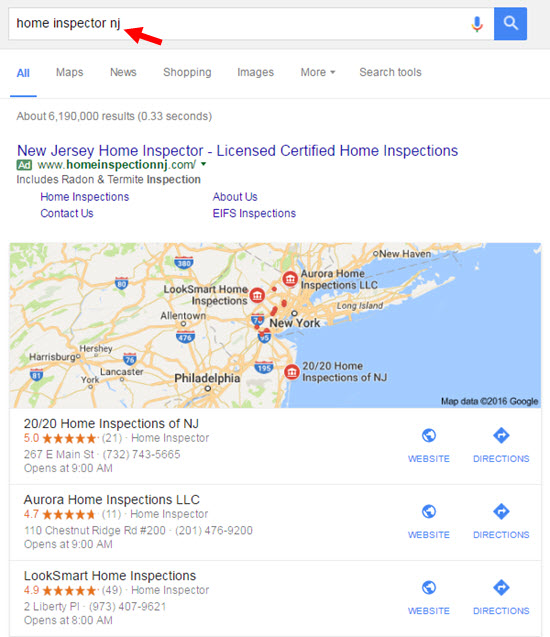
It doesn’t matter whether the state name is at the beginning or end of the query.
A “state-level” search does not include a city. If you search for “dentist Denver CO,” you’re telling Google that you want to see dentists in Denver. Google doesn’t need to grab results from across the state (more on that in a second), so it typically handles that kind of query similarly to how it would handle a search for “dentist Denver” (without the “CO”).
Why would you try to rank for state terms?
1. Some people search statewide. Either they’re in an adorable little state (like Rhode Island), or they want to cast a wider net because they didn’t like what they found nearby.
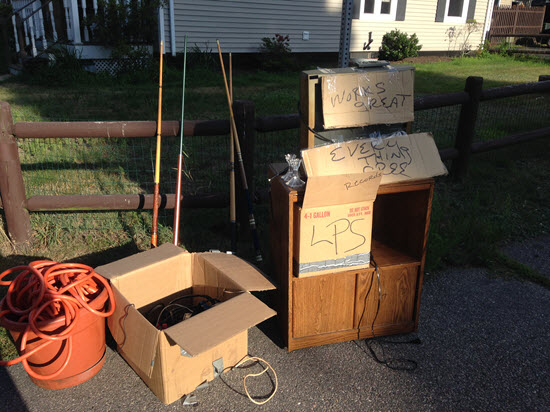
2. Because of point #1, the quality of the search traffic might be surprisingly good (though lower). I suspect people who search on a state level are farther along in the research process than if they were still searching for whomever or whatever is closest. So I suspect they’re more willing to drive.
3. Fewer competitors will think to try to rank for state-level terms. They won’t know what hit ’em.

4. It beats trying to optimize your pages for 5 different cities you think you can target on one page, or by cranking out several separate pages.
5. It can supplement your city-level visibility. You’ll still probably rank in (and maybe around) your city, if you’ve put in the work.. Ranking statewide won’t somehow “water down” your relevance to your city.
How does Google handle state-level searches?
A state-level search may pull up Google’s local 3-pack, or it may not.
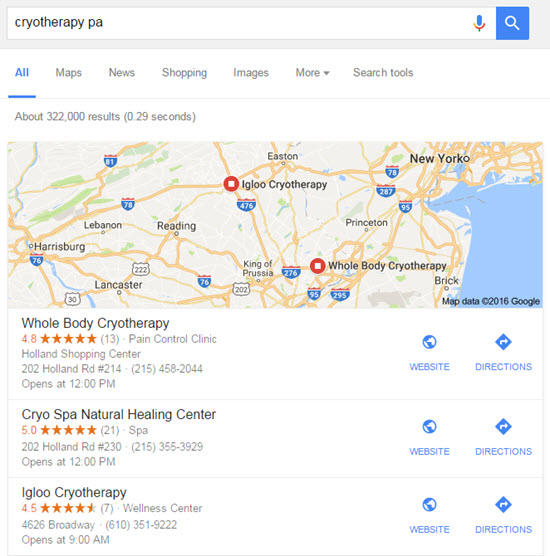
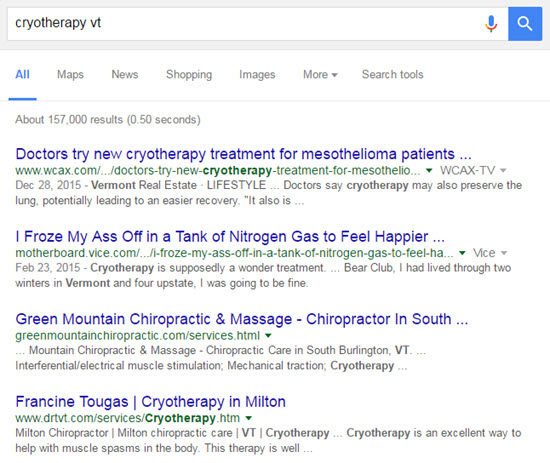
When it does pull up a map, Google often draws results from the big cities – usually from the biggest urban area in the state – but not always. Sometimes you’ll see results from all over the state. Why the variation? Good question. I haven’t figured out the rhyme or reason (yet?).
Google’s a little more predictable in how it handles search terms that strictly pull up organic results – that is, with no “local map.” Usually, Google will show the sites or pages with the strongest link profiles or – for less-competitive search terms – the sites simply with the best (or spammiest) on-page optimization.
How do you rank for them?
First, some big-picture things that you may or may not be in your control, but that seem to affect your ability to rank for state terms:
1. Specialize in a niche, if you can. As I’ve written, it’s often easier to rank for specialized services, and perhaps even more so if you’re targeting a state when most people only think to target a city. Also, in some ways it’s just smarter marketing (you’re not trying to be all things to all people).
2. Try it for services where people are willing to travel, or where they don’t have to travel, or where they don’t have to pay extra if you travel. If you’re a plumber, customers won’t pay you to travel 100 miles to be a plumber. But if you’re the only plumber in the state who specializes in repairing their high-end European-made tankless water heater that always seems to break – and they know that because you actually talked about it on your site – they might just put you up in the Ritz.
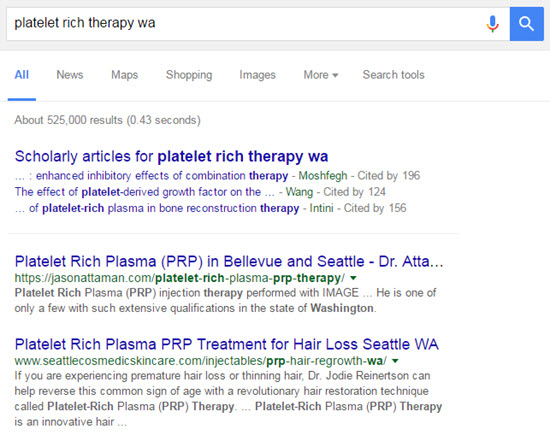
3. Be in geographically small state, or at least in one where most of the big population-centers are pretty close to each other. Think Maryland, New Jersey, or Massachusetts.
Mind you, I wouldn’t expect you to join me in the Massachusetts mayhem for minor local SEO considerations (though perhaps you would for my charm chahm). It’s just that if you’re not in one of those major population centers, at least you’re not so far outside of them that Google has to stretch the map just to include you.
Now for the nuts n’ bolts. Much of this is similar to the advice I’d give if you had no interest in state-level search terms. But it’s especially germane to “state local SEO.” Also, you’ll need to put a state-oriented twist on some of it.
4. Go for a granular site structure. Having, for example, an in-depth page on each specific service you offer is smart anyway. But it’s extra-important if you’re trying to scoop up some visibility on the state level. Why? Because if a given page is focused on a highly specialized, “niche” service it’s more likely to rank without too much heartache. Google and visitors usually prefer a clear focus over a “big happy family” -type page that lists 10 different services. Combine that topical focus with a focus on the state – rather than on the city where all your competitors also try to rank – and you’ll have either some state-level rankings already, or you’ll be well on your way.
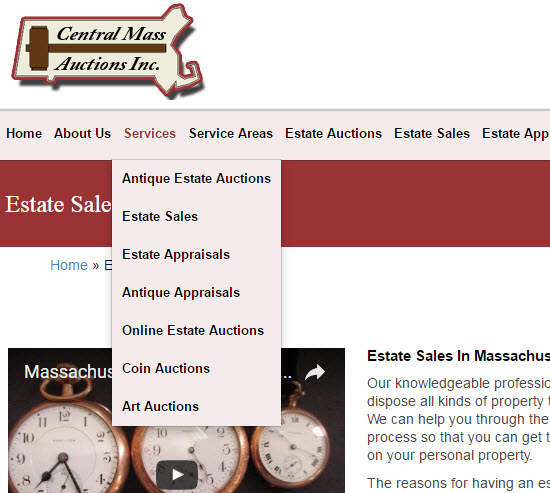
5. Rack up the good links – especially ones relevant to your area. Be on the prowl for links that are relevant to your state, like statewide industry associations you can join. Of course, get some strictly “local” links (some ideas). Keep in mind: Google will draw from a bigger pool of competitors, from across the state, to determine who should rank for state-level search terms. Be the site that benefits from a Google that cherry-picks.
6. Consider your business name. That still matters more than it should. You’re probably not in a position to rename your business. On the off-chance you are, consider making the state part of your official, legal business name.
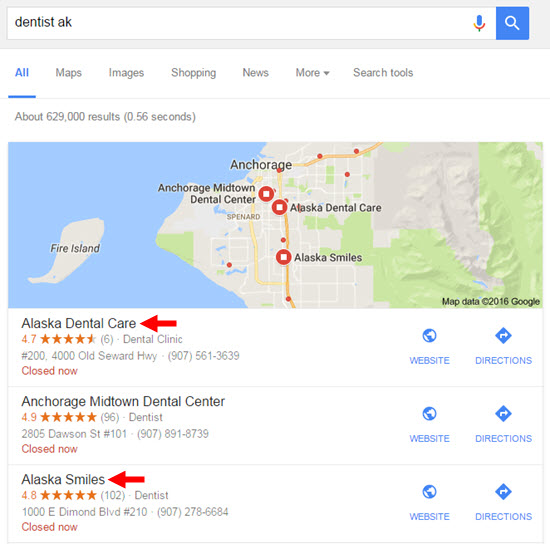
7. Pile on the reviews – especially more Google reviews. If you’re going for state terms, reviews seem to matter even more than usual, at least in my observations. The businesses that rank for state terms typically have more reviews than do businesses that rank well in one city or another.
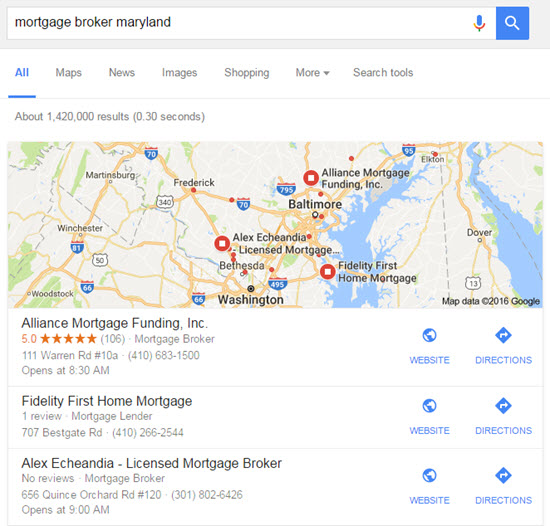
Now, let’s assume that’s not simply because those businesses are better at all aspects of marketing, and that good rankings and lots of reviews aren’t just two sides of the same coin. To me, it makes sense intuitively that reviews would matter more than usual. I suspect that when customers search state-wide, Google is even more clueless than usual as to what search results to show. So Google would probably want to identify “the best,” and might rely even more than usual on factors like where reviewers live and what cities or regions they mention in their reviews, and probably a hundred other factors. Again, just speculation.
8. Describe your service area in detail – on your homepage, on important landing pages, on “city pages,” and maybe on a main “Service Areas” page. Don’t just list cities and ZIPs.
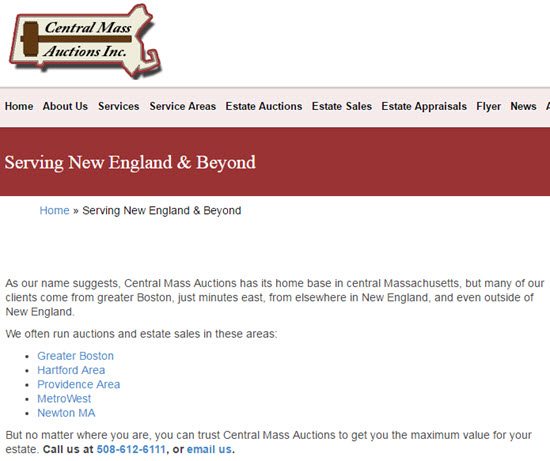
9. Do not underestimate the humble title tag. The two-letter state abbreviation is a high-payoff element to include in there anyway. But it’s a no-brainer if you’re specifically aiming for state terms.
10. Create free resources that anyone in the state would find useful – not only potential customers/clients/patients.
—
Any luck in ranking for state-level search terms?
Any that you’ve worked toward but haven’t ranked for?
Tips? Questions?
Leave a comment!
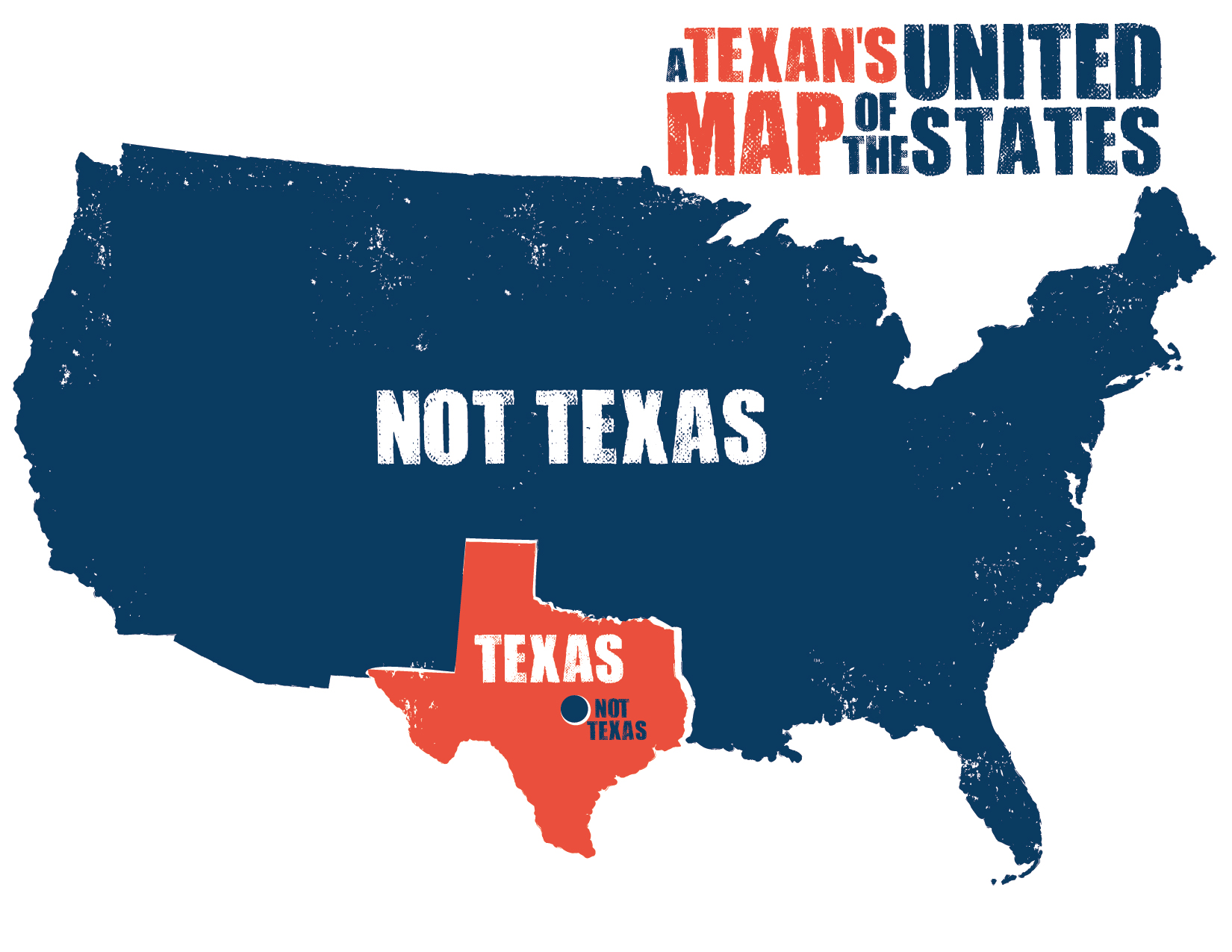
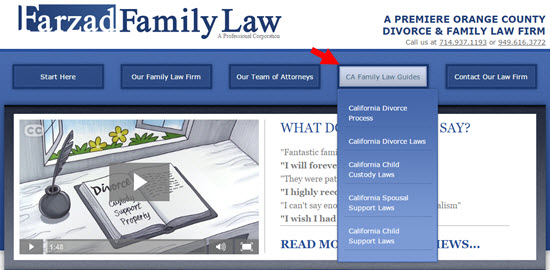
most of this info was either widely known or flat out wrong. “Fewer competitors will think to try to rank for state-level terms. They won’t know what hit ’em.” are you serious? These are the most competitive terms to rank, only second to SOME huge pop cities / counties.
That is what I’ve observed. Feel free to make an argument of substance. Also, did you read the steps where I describe that it often still takes at least a little work to rank for those terms?
Great piece, Phil.
Is it an either/or proposition?
i.e. if I optimize for state level am I risking losing out on some of the specific metro traffic?
Hey Carlton,
In general, no. I’ve often found that if you do what it takes to get state-level rankings, you’ll still have good rankings at the city level. Partly because the best-practices are so similar, and partly because Google knows full well where your business is located, which (for better or for worse) is still a major factor in your city-level rankings. State-level visibility is a bit more of an organic SEO play.
Great article Phil. Its interesting the results I see when I test different industries in different states. When I do one industry in Texas it shows the entire map of Texas but when I do the same industry in …lets say Minnesota or Colorado I just get the main metro areas (MSP and DEN).
I think there could be some good traffic for very niche clients.
Thanks, Michael. State-level search visibility is especially doable (and high-payoff) in niches.
Another home run on the article Phil. Great information. I member during a conversation, you shared this with me. Thank you for putting it together. Hope you don’t mind I shared on Google
Thank you
Hey, thanks a lot, Tim.
Hey Phil this is a great article. You mentioned getting Google reviews is a big factor, but I’m not sure where to send people to actually leave a review now that GMB has made so many changes. Can you point me in the right direction?
Hey Chad,
Sending reviewers to the GMB page (at plus.google.com) is a no-go now. So now what you need to do is direct mobile/tablet users to use the Google Maps app, and have desktop users type in a query that pulls up your GMB page in the knowledge panel on the right (e.g. https://www.google.com/search?q=Local+Visibility+System).
Phil thats very helpful. Thanks!
So, your Review PDF service provide all of those steps? Is that example PDF based on this new method?
Yessir.
You can do the same google search on mobile and if it pulls up your business you can click on it to do a review, since not everyone has the Google Maps App (lookin’ at you, iPhone users). Just make sure it pulls up your business; you may have to add the city if your business name isn’t unique.
Good call, Tony.
Sometimes you even have to include the ZIP or street address to pull up the right listing, if it’s named real generically.
Hey Phil,
Great Article. I’d love tips on optimizing a service page or local landing page for a single location business, car repair (for example) for neighboring towns. I’d love examples, as most techniques I’ve seen feel like keyword stuffing.
Cheers!
Hey Noah,
This post might help:
https://www.localvisibilitysystem.com/2015/04/06/25-principles-of-building-effective-city-pages-for-local-seo/
Finally, an article about state-level SEO. This will be very useful for our clients, some of whom want to target multiple states from the get-go. Thanks, Phil!
Oh, and as a Texan, I’d also like to add that the map of Texas you included is on point. (Apologies to any Austin readers I might have offended with that statement.)
Hey, thanks, Dylan. I’m half-Texan (my mom’s from Austin), so I felt at liberty to “go there” 🙂
I was actually able to use this article yesterday to show prospect why he would need to get local links to make a state-level SEO strategy work, so I’m glad you published it when you did.
That’s great to hear, Dylan. The process of getting those local links pays off in lots of ways.
You’re so right that this has received little coverage in our industry, Phil. Nice topic! The part of this I’ve thought about most over the years is the scenario you cite in regards to industry type. If someone wants the best architect in California to design their hospital campus, they are unlikely to care whether he is in SF or LA … so I think there’s a ‘best in state’ factor here that makes state optimization a very smart choice. I’d like to see more on this topic. Maybe we could even brainstorm together?
Well-said, Miriam!
Yes, I’d like to study and write about this more.
Excellent graphic of “Not Texas”, coming from someone in Austin! And yes I agree – most people don’t think about ranking a local business for a state.
I love Austin, but yeah, different feel from the rest of the Lone Star.
Phil: We’ve had niche businesses in both large and small states. We tend to run adwords on them. We’ve had exact match adwords on both state and city levels. Using that we have a context for total volumes of searches.
As you mentioned, state terms are used more often in smaller states. City terms used more often in larger states. Niche businesses that cover a lot of territory are clearly the recipients of these state level search terms.
A non specialized dentist in San Antonio isn’t going to get customers from Dallas. OTOH, using the example that Miriam gave, and others like it that reflect specialization one will find those searches pop up. If there are 5 specialists in a larger state, you have a pretty fair opportunity to get seen in the PAC and of course you can get high ranking organic traffic.
Significantly these search terms are pretty voluminous in smaller states. Emphasize those terms in Delaware, Rhode Island, Massachusetts, and so on. There is traffic out there.
Thanks, Dave. I’ve noticed the same phenomena in and out of AdWords, too.
Phil: I looked at this a bit more. Before citing examples I agree with your reasoning above and used your methods. They worked.
First on one example, using a large state as an example. We had two different kinds of niche businesses in Pennsylvania, one in the Pittsburgh area, one in the Philadelphia area. We had these businesses when keywords were being shown in all analytics including G analytics. Both businesses ranked highly for the state terms that included service and state term.
Almost NO organic traffic for the state terms. Both businesses ran adwords covering LARGE swaths of territory expanding into the suburbs and beyond out to the hinterlands of both cities. Very little impressions using the state terms. Meanwhile we had pages on each site devoted to larger nearby areas (towns, cities, West Virginia, Erie, Easton, Allentown, Bethlahem, Delaware) etc. Those landing pages received traffic and the two businesses each won some business from residents of those more distant locations. Both businesses were niches. People traveled. It worked. it reflects your suggestions.
Now we also have niche businesses that touch on the DC, MD, Va locations. Maryland being a smaller state than Va, we see significantly more adwords impressions using Md, or Maryland than Va or Virginia. At times we have expanded the adwords impressions territory way beyond our “region” in Northern VA….working down into the populous Richmond area and in pretty populous Charlottesville. Even covering those larger swaths of geography and population….there were more search impressions for Md and Maryland than Va and Virginia.
Methinks that the volume of state terms shrinks in larger states. Yet, as you referenced above if the businesses are niches you can show up in more remote locations with good pages. If you are doing so, choose the remote locations with more population or a population that fits the demographics of your audience.
Lastly the PAC (as it now shows) with 3 smbs for search terms in niche businesses (specialties as you suggest). We have a niche business in a larger state with 4 total competitors state wide. It turns out we seem to have the strongest local visibility. I used the adwords tool to search on “service (plural)/state name. I roamed all over the state choosing cities where the competitors are, our area, towns nearby to those cities, and more remote areas.
In this example, except in the cities where the competitors sit or VERY close suburbs, our site is always first in the PAC statewide. It does help. We get leads statewide and we do get customers who travel statewide for the services. As you noted above in one of your comments, the competitors are “asleep at the wheel” (or something to that effect). We do get customers from their territory. Some of it is a function of simply ranking higher to get the visiibility and the clicks.
In sum, I’d say your post is SPOT ON!!!!! Nice job, Phil. Good advice.
Interesting intel, Dave. Thanks. If the search volume for state terms shrinks in larger states, I wonder if it just shrinks relative to population, or it’s just plain smaller than in smaller states.
In the Pa examples there was teeny teeny usage of either Pa or Pennsylvania in search terms. Far more usage of Philadelphia or Pittsburgh. Other cities got used. Really tiny usage of state terms. Two very different types of niches in two parts of the state.
In the MD/VA example….this goes back to when we were seeing organic results….and is based on organic keyword traffic from the past and impressions over a long period of time. There has always been more overall usage of the state term in Md than in Va. We’ve been in some other smaller states and they use the state terms pretty extensively. In larger states we simply don’t see a lot.
By the way, in the MD/VA example our “reach” in both MD and VA is pretty similar in total population in each state….so its not based on percentage its based on total numbers.
To date our experience is that there is more usage of state terms in smaller states. Hey I’d like to hear others’ experiences.
To reiterate…your suggestions about targeting distant towns with content etc is/was VERY effective. We did it and do it. We land traffic, leads and sales. We had individual pages/articles that would reference a distant population/city or a state (Delaware or the part of West Virginia closest to Pittsburgh). Like most of our traffic and sales the majority is local and proximate. Targeting further locations is GRAVY. And it “tastes good”.
Did you go so far as to target “NOVA”? I always wonder about non-state regional terms like that, or “New England” or “Long Island,” etc.
Hey Phil: Here we go again. I’ve been posting on this because it does work on certain levels. I’ve read and reread your post. Our very long experience is that DEPENDING on the circumstances or locations state level rankings, visibility, creating pages, titles, etc DO WORK in certain cases and they don’t work in others.
As to the NOVA term and as to regional terms. The ANSWER IS YES….but not always 😉
We learned this tip about 12 years ago from some guy that was then operating a reasonably large LOCAL search engine/directory type of site with a lot of traffic. He gave out good advice. Just think. He was seeing MORE local traffic than virtually anyone (excepting the google monster) and was seeing all the organic traffic and search phrases.
He suggested using regional phrases, neighborhoods, popular local descriptions such as “THE LOOP” in Chicago…and all that kind of “jazz”. We’ve used them ever since for every smb in each different location for the relevant regional or neighborhood descriptions.
They work. Some work better than others. I suspect if the regional phrase gets used a lot in every day normal conversation it gets used a lot in search phrases. BTW: We use county terms besides state and city, and town, and regional phrases. hey if you are posting in a county with a population of about 1 million give or take…you will get search terms using the county name.
Just so you know, under your description above: Why DO YOU WANT To Work on State Terms, 3rd reason–> Your competitors won’t know what hit them. Ha ha. Aint that the truth…in some cases we SO dominate the regional description SERPS we specifically didn’t advertise. Why pay google when we dominate the PAC with a one box, the top 2 or 3 organic rankings….
Which one’s dominate? I can’t put my finger on that question. Just try them all. Hopefully you hit some winners.
Interesting stuff and great insights. Thanks, Dave.
Phil: Your original post intrigued me. The main reason is simply that we’ve practiced it for years for various businesses. We picked up really great advice on this, probably around 2004, from someone in a “help mode” as your blog pieces often reflect, and it was incidentally someone who was seeing and reviewing local search terms at far greater volume than virtually anyone. He was helping people with his suggestions.
Today I quickly scanned adwords impressions for one of the niche smb’s looking for terms that applied to geography. I looked at year to date for this year and then looked at year to date totals for 5 years ago, same time period.
Some quick observations.
In both cases we were seeing impressions at roughly the same totals–it was somewhere in the 80 k to 100 k range. That is our rough estimate for “demand” (in an economic perspective econ 101; demand and supply) We’ve looked at that for years. The niche in that location has remarkably “flat demand” over many many years. Not much change in the number of impressions we see.
I filtered for various terms and also counted impressions on search terms for geo type phrases; ie state names, state abbreviations, city and town names, regional phrases (ie northern or southern and others).
Some observations without going into further depth:
A. This niche business and others are all niches, all regional, and all draw from wide geographies, albeit more customers and leads from closer in than further out. All of them have relatively few competitors. That makes this one and others VERY appropriate for state terms.
B. Of the 80-100K impressions largest number of search terms DO NOT use geo terms.
C. Next most significant search term are those that reflect the local CITY.
D. State terms are NEXT after the city term and close in volume. This one is in the DC area, so it gets geo terms with DC and Geo terms with Md, Maryland, Va, and Virginia. LOTS of VOLUME on those state terms.
Lots more volume on state terms than major suburban town/cities. LOTS MORE. not a lot of use of town names in the case of this smb and the other niches. I’d suggest that searchers sort of know its a niche, or discover that quickly and then search on larger geographic terms (like state descriptors).
After all that is said and done all the other geo terms are sort of minor. We know in this example and in some others in different regions there are some REGIONAL terms that are pretty important. I’d certainly use those. They are important, but you have to get STRONG, optimized and seen on other terms FIRST.
Now here is the AMAZING difference between 2016 and 2011.
NEAR ME is a phrase that is gaining in WIDE and extensive popularity. The growth is significant. Absolute number of searches is pretty HIGH, not as high as the major city and major state names in this case….but higher than any other geo term we are seeing.
The above was only a cursory look. I’m aware NEAR ME has grown for every smb type in every region we’ve experienced.
We’ve worked with pages using NEAR ME in the title and content. We can improve. Also the organic results can fall under the PAC. We are slowly working on Near Me pages for every smb. Growth of usage of that term is pretty significant.
Its TOO DAMN BAD google has all this data and NO Businesses have any context of this at all, except if they are using adwords, and if they rely on Webmaster tools they are only “getting” what google allows them to get. Its not full data. Google knows everything. The rest of us are thrown crumbs.
Its why its important for all the rest of us to put our heads together to figure this out. 😉
That is about it for me Phil. I like the topic, because its applied to us. We’ve used it extensively, its been of great value….and all of us who are bounced around on the end of google’s yoyo need to regain some knowledge, understanding, and control.
So, what do you do if you have local address. You’re a freelancer who can be basd anywhe but sservie the whole state? Local schema is out, unless you want a virtual office address that maybe 50 othr peopel use online and that hurts you if you try to be another person in that suite (Or fake suite)
Depends what the goal is. You can rank just fine without your address on every page.
My head is absolutely spinning. I’m a Realtor in Minnesota and I do all of my own SEO and lately, have been buying domains and building WordPress sites like crazy so this is all very exciting to read about. I’ve created a lot of GMB pages and use the Remax offices around the state for my addresses, but have always wondered if there is a workaround because there are usually 50+ other agents doing the same thing. I also worry about my footprint as I have a ton of email addresses and online avatars. It’s a lot to keep straight and I hope I’m not shooting myself in the foot. My main money website does well, but I’m always trying to diversify.
That sounds like a risky setup, Joe.
Hey Phil first of all nice article ! I agree with you that you have to specialize in a niche but there’s not much flexibility when it comes to changing the geographical area to a small one and Reviews matters a lot when it comes to listing, Usually the sites ranked in Local pack have many good reviews. Thanks I loved the tips on local service ranking!
Excellent article, does this work for any niche state wide or do the tactics vary per each one?